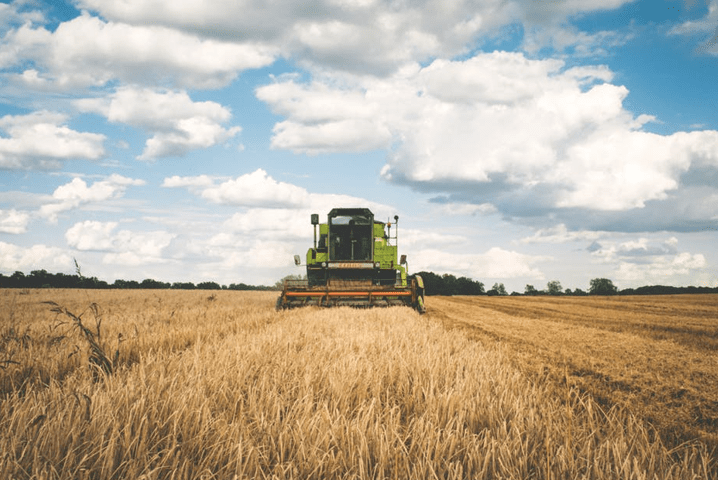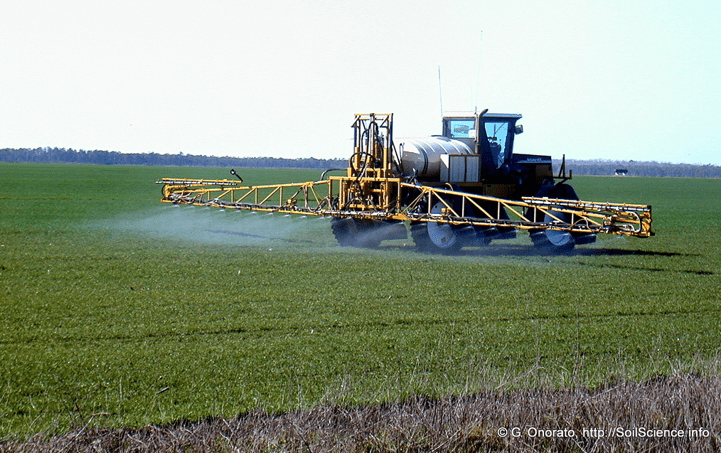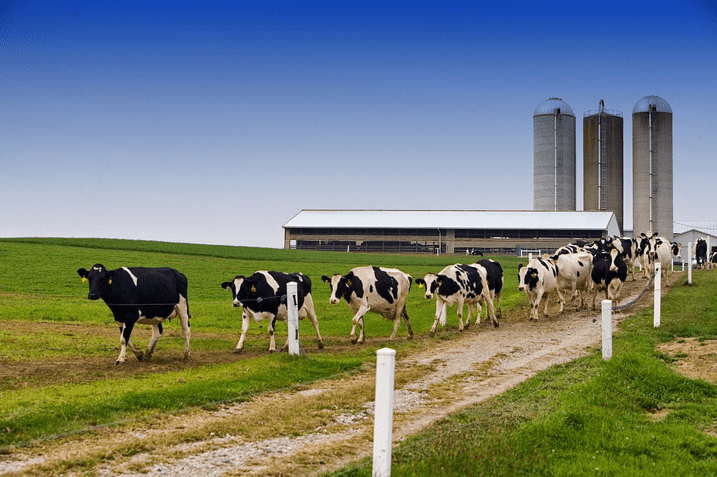Check Out Our Agribusiness Definition and Agribusiness Examples To Understand This Industry This Year
You probably know what agriculture is, and you probably know what business is. But when you put them together to create agribusiness – what exactly does that all entail? What’s the definition of agribusiness?
Is agribusiness the all-encompassing word for agricultural production? Or is agribusiness only a portion of the agriculture industry?



Image Source: Pexels
We are here to give you a definition of agribusiness that will clear it all up. This is our guide to agribusiness – including an agribusiness definition and agribusiness examples.
Here is what you will find in this agribusiness definition guide:
- We will start with looking at the definition of agribusiness from many of the top sources
- Then we will give you our own agribusiness definition, along with extra tidbits about agricultural production
- Next we will list out agribusiness examples so you will have an idea how the definition of agribusiness plays out in real life
- Finally, we will discusses some of the criticism and the praise of large-scale agriculture business
By the end of reading through this guide, you should have a great idea of what agriculture related business is.
See Also: What Is a Wind Farm? | Wind Farms Pros and Cons | How Do Wind Farms Work?
Understanding Agricultural Production
Before we get into a definition of agribusiness or agribusiness examples, let’s make sure we all understand agricultural production in the United States. Some stats will help.
There are over 2,000,000 million farms in the United States. These farms create a gross output of $374.174 million annually. And the total value of the United States agricultural exports to other countries is over $150 billion.
As you can see, the agriculture industry has plenty of opportunity for big business.
Earlier in history, all these farms were family run. Today, only 36.8% of these farms are run by full-owners. So that big business is going straight to large companies.
More and more corporations are taking over the daily business of running this industry of agriculture. This is not necessarily the planting of seeds, but the manufacturing and development of machinery, chemicals, genetically modified seeds, etc.
This type of agriculture related business is exactly what we will be exploring in our agribusiness definition below.
The Official Definition Of Agribusiness
To fully understand what agribusiness is, let’s first look at an agribusiness definition from some official sources.



Image Source: Creative Commons
According to Merriam-Webster, the definition of agribusiness is:
“An industry engaged in the producing operations of a farm, the manufacture and distribution of farm equipment and supplies, and the processing, storage, and distribution of farm commodities.”
And Investopedia’s agribusiness definition is:
“The business sector encompassing farming and farming-related commercial activities. Agribusiness involves all the steps required to send an agricultural good to market: production, processing, and distribution. It is an important component of countries with arable land, since agricultural products can be exported.”
According to Wikipedia, the definition of agribusiness is:
“The business of agricultural production.”
The Balance offers this agribusiness definition:
“Agribusiness refers to the business of farming, although, oddly, the term is not often used in correlation with actual farms. Instead, the term agribusiness most commonly means an agriculturally-related business that supplies farm inputs, such as farm machinery and seed supply.”
The term “agribusiness” is also used to describe businesses that are involved in the marketing of farm products, such as warehouses, wholesalers, processors, retailers and more.
Finally, according to Business Directory, the definition of agribusiness is:
“A business that earns most or all of its revenues from agriculture. An agribusiness tends to be a large-scale business operation and may dabble in farming, processing and manufacturing and/or the packaging and distribution of products.”
All-in-One Change Management Tools
Top Rated Toolkit for Change Managers.
Get Your Change Management Tool Today...
Our Agribusiness Definition
Now let’s take each definition of agribusiness and boil it down to the main points:
- Agribusiness is a shortened word for “agriculture business”
- Agribusiness is large-scale (as opposed to small, organic farms)
- Agribusiness is mostly about the outside inputs that help maintain a large-scale operation (fuel, fertilizer, insecticides, equipment, food, pesticides, etc.)
- Agribusiness has more to do with agriculture related business than the actual farming itself
- Agribusiness has a focus on commercial activities within the agriculture industry
When we talk about an agribusiness definition, we are not necessarily referring to the act of farming or even farms themselves. We are talking about all the business aspects surrounding the agriculture industry.
Don’t Miss: How Wind Turbines Work? | Guide | Wind Turbine Cost & Efficiency
Other Things To Know About Agribusiness:
While the definition of agriculture is helpful to understanding what agribusiness is, there are countless other aspects about agriculture business that are helpful to know.
- The Food and Agriculture Organization of the United Nations spends some time discussing and looking into agribusiness
- You can receive degrees in agribusiness at schools like Cornell, University of Georgia, Pennsylvania State, and many more
- The term “agribusiness” was coined by Ray A. Goldberg and John H Davis with their book A Concept of Agribusiness in 1957
- Jobs within the agribusiness field include: Farm managers, crop producers, marketers, finance managers, market analysts, poly analysts, appraisers, and more.



Here Are Some Agribusiness Examples
If the concept of agribusiness is still a bit confusing, sometimes seeing a real-life example of agribusiness can be helpful.
Here are some great agribusiness examples common in 2017.
Archer Daniels Midland Company: The first of our agribusiness examples creates feed, bioenergy, food, etc. for the agriculture industry. As a public company, this agriculture related business has $67.702 billion in revenue.
Deere & Company: This example of agribusiness is a public company with $37.795 billion in revenue. They are one of the top producers of agriculture business equipment (example: tractors, cotton pickers, field sprayers, etc.)
Dow AgroSciences: As one of the top agribusiness examples, Dow AgroSciences contributes to agriculture business through production and sell of insecticides, fungicides, herbicides, seed technology, and fumigants. This is not a public company.
DuPont: This may be one of the more surprising agribusiness examples. Though known for many other ventures, DuPont is involved in agriculture related business by focusing on agriculture chemicals.
Monsanto Company: This next example of agribusiness is also a public company with around $15 billion in revenue. They create herbicides, pesticides, and crop seeds for the agriculture industry.
Syngenta: Syngenta is another one of the top agribusiness examples when it comes to chemicals. They create pesticides, seeds, and flowers for agricultural production – which has boomed them into a $13.411 billion revenue.
Of course there are countless other companies we could consider agribusiness examples. But these are a few that show you the large-scale business of agricultural production.
Related: How Solar Energy Works | Review | Solar Energy Pros and Cons
More Top Agribusiness Examples
For more agribusiness examples, WATTAgNet gave a list of their top 7 most popular agribusiness companies. These are global companies, not only those in the United States.
These agribusiness examples were:
- Cargill: “The world’s No. 1 feed producer in the October/November 2015”
- Tyson Foods: “The second-largest poultry producer globally”
- BRF: A meat, poultry, and food company
- Alltech: Feed company
- JBS: Agribusiness based out of Brazil
- Bachoco: Agribusiness based out of Mexico
- Foster Farms: Agribusiness based out of California









Criticism of Agribusiness
For many, agribusiness is the way our country creates food. For others, the definition of agribusiness is ruining our food creation. This is the on-going debate between corporate farming and family farming.
Texas A&M, for example, produced a chart comparing “agriculture’ to “agribusiness.”
Here is what they say about traditional agricultural production:
- Self-contained
- Small scale (50 to 150 acres)
- Diverse
- Lower “efficiency”
- Low pollution
- Byproducts stay on farm
- Many laborers
- Maintains local culture
- Sustainable
- Maintains soil
- Works with nature
- Income remains local
- Durable
- Ignored by USDA
In contrast, here is what they said about agribusiness, AKA large agriculture business:
- Requires many outside inputs
- Large scale (300+ acres_
- Monoculture
- Vulnerable to pests, price fluctuations
- High pollution
- Runoff from fields, “wastes” accumulate
- Few laborers
- Destroys local culture (high cancer and suicide rates)
- Nonsustainable
- “Mines soil”
- Industrial approach
- Income centralized
- Very vulnerable to disruptions (depending on central facilities, transportation
- USDA supported
As you can see, big agribusiness and the agribusiness examples we already discussed are not met with continually positive reviews. Many look upon big agriculture business as a way for the few to make money while the rest of the country suffers.
Green America also criticizes agribusiness violating human rights, pollution tradition crops, deforesting illegally, and inappropriately tying politics to the agriculture industry.
Praise Of Agribusiness
It would not be fair to only look at the criticism of large-scale agriculture business. Is there an example of agribusiness creating positive impact?



Image Source: Pixabay
The Agribusiness Council lists some reasons why this type of agriculture related business is so important. Here are only a few of their points:
- Agribusiness allows the world to “grow, trade, and feed everyone” by only using finite resources
- Agribusiness provides employment opportunities for half of the world and accounts for 4% of consumer purchases
- Rising global population requires new, larger methods to supply enough food
- Natural production systems of agricultural production are “nearly capacity” and have restrictions
- Agribusiness achieves efficiency
- Agribusiness encourages the new generation to study the industry of agriculture in college
They also believe that the negative “image problem” has been caused by agribusiness’s success.
Whether or not you believe that agribusiness is a good thing or a bad thing, there is no denying that its presence makes a big impact on the agriculture industry in one way or another.
Popular Article: Wind Energy Definition & Uses | Advantages and Disadvantages of Wind Energy | How Wind Energy Works
Free Wealth & Finance Software - Get Yours Now ►
Conclusion – What Is Agribusiness? An Agribusiness Definition
Now you should be able to answer the question “What is agribusiness?” with new confidence. You know the definition of agribusiness, as well as top agribusiness examples.
You can see how traditional agriculture production differs from large-scale agriculture business. You can also see where agriculture related business could get criticism as corporate farming instead of family farming.
Whether are interested in this field, or simply want to know more about the agriculture industry, this agribusiness definition will help you have a better understanding.
AdvisoryHQ (AHQ) Disclaimer:
Reasonable efforts have been made by AdvisoryHQ to present accurate information, however all info is presented without warranty. Review AdvisoryHQ’s Terms for details. Also review each firm’s site for the most updated data, rates and info.
Note: Firms and products, including the one(s) reviewed above, may be AdvisoryHQ's affiliates. Click to view AdvisoryHQ's advertiser disclosures.



